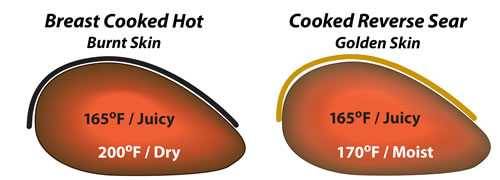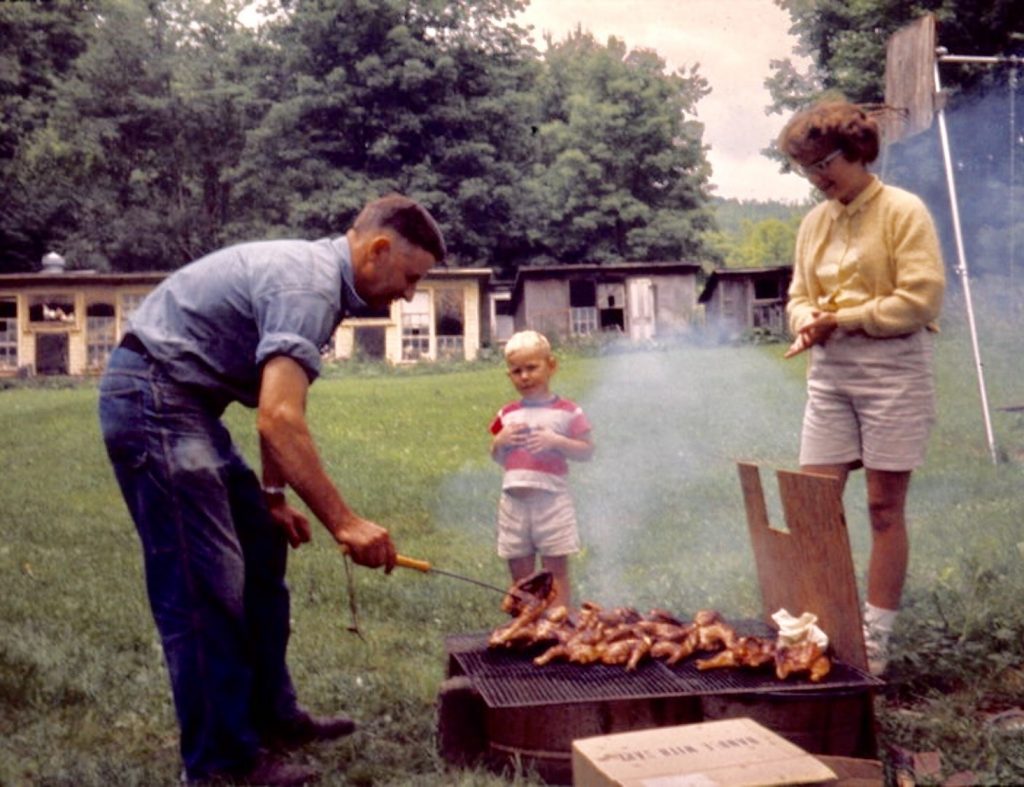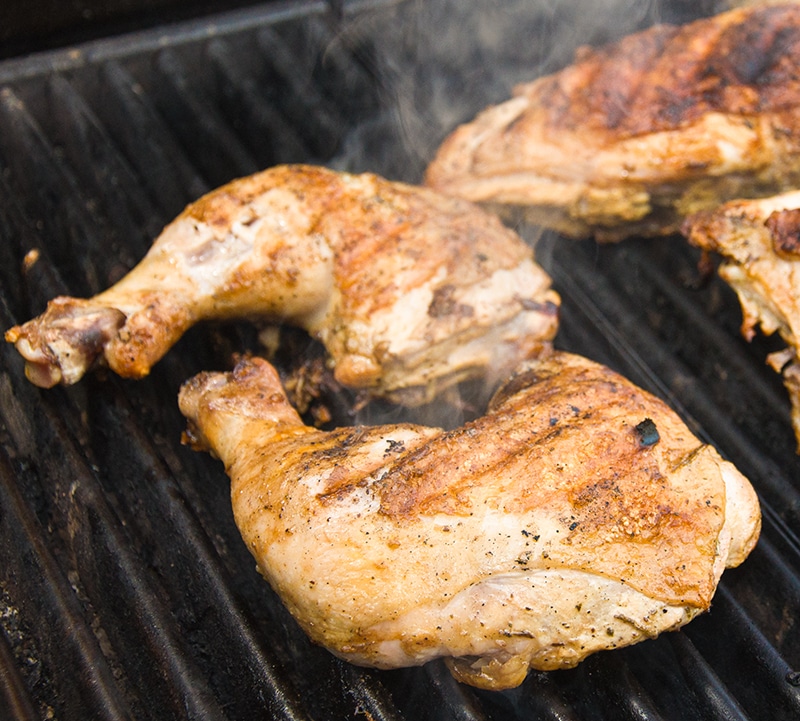Moist and juicy with perfectly crisped skin, this grilled chicken recipe is head and shoulders above the bland and charred version many of us grew up with.
If you like grilled chicken with golden crispy skin, say “thank you, to Bob Baker.”
Baker was a professor of food science at Cornell University and I once had the honor of meeting him when my wife was a PhD candidate in microbiology at Cornell.
A specialist in poultry, he helped invent such oddities (at the time) as chicken nuggets, turkey ham, and poultry hot dogs. But in picturesque Ithaca, NY, where Cornell is located, about six hours north and west of Manhattan, he is best remembered for Cornell Chicken, and there is nothing odd or artificial about his wonderful recipe. In fact, the recipe has become so popular it is served all across Western New York even though, much to the chagrin of Ithacans, the original version was created while he was at Penn State, just before he got a job at Cornell. The oldest version is contained in a Cornell Cooperative extension Bulletin probably from the early 1950s. Above is a photo of Nathan “Nate” Hardy from the early 1960s in Almond, NY, cooking Cornell Chicken, contributed with permission by his family. The buildings in the background were once chicken houses.
I lived in Ithaca for 18 years and fell in love with this recipe in a hurry. Every fund-raising event, every fire department cookout, every little league barbecue, must serve this recipe or nobody would come. Even though Baker died in 2006, his family continues to operate Baker’s Chicken Shack at the New York State Fair in Syracuse.
Cornell Chicken is often served with Syracuse Salt Potatoes, small white local potatoes boiled in salty water. The area is also a major cabbage producer, so Waldorf Slaw is another natural NY themed side. Wash it all down with a white wine from the Finger Lakes. Riesling is the strong suit there. End the feast with Concord Grape Pie a unique invention from nearby Canandaigua Lake topped with a scoop of ice cream from The Cornell Ag School’s Dairy Bar where they students are taught to make it properly. I’ll have the world’s best butter pecan, please.

Below is my slightly modernized version of Dr. Baker’s Original Recipe. I found the original recipe to be just a bit salty with three tablespoons, so I cut it back to one. He recommends cooking it over an open flame without a cover, but that method often yields charred skin, flareups, and soot deposits by the time it is cooked through. It works much better if you start it low and slow on the indirect heat side, and then move it over the direct heat at the end to crisp the skin, using the reverse sear technique. I have also built in a precaution that will make working with raw eggs safer.
Makes:
Takes:
Ingredients
- 1 egg
- 1 cup vegetable oil
- 2 cups cider vinegar
- 2 tablespoons Morton Coarse Kosher Salt
- 1 tablespoon poultry seasoning or Simon & Garfunkel rub
- 1/2 teaspoon ground black pepper
- 2 broiler chickens cut into quarters
These recipes were created in US Customary measurements and the conversion to metric is being done by calculations. They should be accurate, but it is possible there could be an error. If you find one, please let us know in the comments at the bottom of the page
Method
- Prep. In a large bowl, whisk the egg white and yolk together with a balloon whisk or a hand mixer. Add the oil and whisk until it gets thick, homogeneous, and a bright yellow, for about 2 minutes. A balloon whisk is the best tool for this job since the wire strands really do a good job of emulsifying (mixing together) two ingredients that don’t want to mix, one oil based, the other water, but a fork will do in a pinch. Now whisk in the vinegar and salt. This makes it a brinerade, a combo brine and marinade.
- Stab the chicken skin several times with a fork or knife so the fat can get out when cooking. This will help make the skin crispy. Marinate/brine the chicken for 3 to 24 hours in zipper bags in the fridge. You can do this in a bowl or pan, but you need more marinade than if you use zipper bags. Every hour or so, turn the meat a bit so all surfaces get well coated.
- Fire up. Set up the grill for 2-zone cooking. Try to get the indirect side in the 225°F (107°C) range. If you're in a hurry, you can take it up to 325°F (163°C), but I prefer low and slow. Sprinkle the rub and black pepper on all sides of the meat.
- Cook. Place the chicken over the indirect zone and close the lid. Every 5 to 10 minutes baste with the marinade in a dabbing motion rather than a painting motion, being careful to not wash off the rub, turn the chickens on both sides, and move the ones closer to the heat away and the ones away closer.
- Cook the chicken for about 60 to 90 minutes until the internal temperature of each part is 150°F (65°C)and stop basting. The baste is contaminated and we want the final searing step to pasteurize the surface of the meat. Exact time will depend on how thick the meat is, and how often you basted. Then move them over the hot direct heat side of the grill, skin side down, lift the lid, and crisp the skin without burning it for 10 to 15 minutes. Flip and heat for about 5 minutes more. This step is important to finish the cooking of the meat, crisp the skins, and make sure everything is pasteurized since raw egg can contain salmonella. When the skin is crisp and the temp is 165°F (75°C), take the meat off. Even if it is a bit red in there when you cut in, it is safe at 165°F (75°C). You cannot judge a chicken's safety by the color of the juices! When cooking chicken you must use one of the fine new digital thermocouple thermometers available nowadays to make sure your poultry and other foods are cooked properly for taste and safety.
- Serve. Serve the chicken immediately alongside your favorite side dishes.




High quality websites are expensive to run. If you help us, we’ll pay you back bigtime with an ad-free experience and a lot of freebies!
Millions come to AmazingRibs.com every month for high quality tested recipes, tips on technique, science, mythbusting, product reviews, and inspiration. But it is expensive to run a website with more than 2,000 pages and we don’t have a big corporate partner to subsidize us.
Our most important source of sustenance is people who join our Pitmaster Club. But please don’t think of it as a donation. Members get MANY great benefits. We block all third-party ads, we give members free ebooks, magazines, interviews, webinars, more recipes, a monthly sweepstakes with prizes worth up to $2,000, discounts on products, and best of all a community of like-minded cooks free of flame wars. Click below to see all the benefits, take a free 30 day trial, and help keep this site alive.
Post comments and questions below
1) Please try the search box at the top of every page before you ask for help.
2) Try to post your question to the appropriate page.
3) Tell us everything we need to know to help such as the type of cooker and thermometer. Dial thermometers are often off by as much as 50°F so if you are not using a good digital thermometer we probably can’t help you with time and temp questions. Please read this article about thermometers.
4) If you are a member of the Pitmaster Club, your comments login is probably different.
5) Posts with links in them may not appear immediately.
Moderators